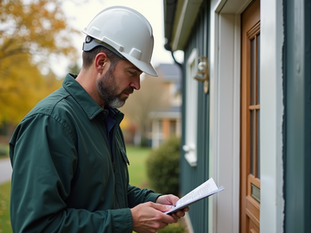
The Importance of Comprehensive Home Inspections
Jul 7
3 min read
0
6
0
When you're buying or selling a home, the stakes are high. A home is often the largest investment most people will make in their lifetime. To protect yourself and your financial interest, understanding the importance of thorough home inspections is essential.
Thorough Home Inspections: Why They Matter
A thorough inspection can save you from costly surprises after the deal is done. Many homebuyers assume that a newly built or recently renovated property doesn't need inspection, but that's a myth. Issues can arise in any house, and early detection can prevent extensive repairs down the line.
The National Association of Realtors reports that nearly 45% of homebuyers encountered at least one issue that they wished they had known before purchasing. Having a detailed assessment done can provide peace of mind.

What is a Comprehensive Home Inspection?
A comprehensive home inspection is a systematic examination of a property's condition. It covers various aspects such as:
Structural Components: Inspectors assess the foundation, roof, and other integral parts of the structure.
Mechanical Systems: This includes plumbing, electrical, and HVAC systems, which are often costly to repair if issues are found later.
Interior Elements: Walls, ceilings, floors, and windows, as well as appliances and fixtures, are thoroughly examined.
Exterior Areas: Inspectors evaluate the yard, drainage, and any outdoor structures.
The inspection usually lasts a few hours and is conducted by a certified home inspector. A comprehensive report is generated, detailing any problems found and their severity. This documentation can be a valuable tool for negotiations.

Common Issues Found During Inspections
One of the main benefits of having a thorough home inspection is identifying potential issues that may cause significant problems in the future. Here are some common issues inspectors often find:
Roof Problems: Leaks, missing shingles, and deterioration can lead to serious water damage.
Pest Infestation: Termites, rodents, and other pests can compromise a house's structure.
Electrical Issues: Outdated wiring and improper installations can pose serious safety hazards.
Plumbing Problems: Leaky pipes and faulty faucets may not be visible but can lead to significant water damage and high repair bills.
Mold and Mildew: These can thrive in hidden areas and cause health problems for occupants.
Statistics show that 70% of buyers found issues during their inspections, with an average repair cost reaching thousands of dollars. Knowing these issues can help buyers negotiate repairs or lower prices before finalizing a purchase.

Choosing the Right Inspector
When seeking a home inspection, selecting the right inspector is critical. Here are some tips for choosing a qualified home inspector:
Certifications and Experience: Ensure the inspector has relevant certifications. Organizations like the American Society of Home Inspectors (ASHI) have strict standards.
Reviews and References: Check online reviews and ask for references to ensure you are working with a reputable professional.
Detailed Reports: A good inspector should provide a detailed report with visuals and explanations of any issues found.
Availability: When you need a thorough inspection done promptly, flexibility can make a difference.
Understanding the qualities of a good inspector can guide you in making a confident decision when protecting your investment.
The Risks of Skipping Inspections
Some buyers may be tempted to skip the inspection to expedite the home-buying process, especially in competitive markets. This could lead to regret. The risks associated with skipping a comprehensive inspection far outweigh any perceived benefits:
Unforeseen Expenses: Without an inspection, you may close on a property only to find significant issues post-purchase, leading to costly repairs.
Insurance Challenges: Some insurance companies might deny coverage for issues not disclosed in the home inspection report.
Resale Difficulties: If you encounter problems after purchasing, it might lower your property value, making resale challenging.
Legal Issues: If undisclosed issues surface, you may face legal challenges with the previous owner, leading to potential lawsuits.
It's crucial to see home inspections as a priority rather than a formality.
Final Thoughts
Thorough home inspections are vital in making an informed decision when buying or selling a property. They offer protection against costly surprises and help ensure that the integrity of the home is intact. By investing time and resources into a thorough inspection, homeowners can enjoy their investment confidently.
If you're considering buying or selling your home, don't overlook the importance of comprehensive home inspections. They guide you through the process and empower you with the knowledge you need for a successful transaction. For more information on what to expect during an inspection, check out comprehensive home inspections.






